The prostate is a small, walnut-sized gland that is part of the male reproductive system. Aging and unhealthy lifestyle factors can cause it to become enlarged—leading to urinary problems and sleep interruptions. (1) This condition affects about half of men aged 50 and up. (2) If you’re approaching this age (or you’ve already surpassed it), you may be interested in supplements that help support optimal prostate health.
The best supplements for prostate health are made with safe and effective ingredients at helpful dosages and tested for quality. They may help support prostate function in combination with healthy lifestyle choices. Still, there’s insufficient evidence that they can treat or reverse prostate health issues like enlarged prostate or prostate cancer.
Below, we’ve highlighted five supplements that are potentially helpful for prostate health.
Editor’s choice
Our editor’s choice pick for the best prostate supplement is VigRX Prostate Support. We like that this supplement contains 30 natural ingredients to help support prostate health, including saw palmetto, beta-sitosterol, pygeum, and pumpkin seed powder.
Medical disclaimer: This article is intended for educational and informational purposes only. It is not intended as a substitute for medical advice. For health advice, contact a licensed health care provider.
Our picks for the best prostate supplement
- Best for enlarged prostate: VigRX Prostate Support
- Best natural: Nutricost Saw Palmetto Capsules
- Best zinc: Sports Research Zinc Picolinate
- Best over the counter: 1st Phorm Complete Prostate
- Best iodine: Naked Nutrition Multivitamin for Men
Compare prostate supplements
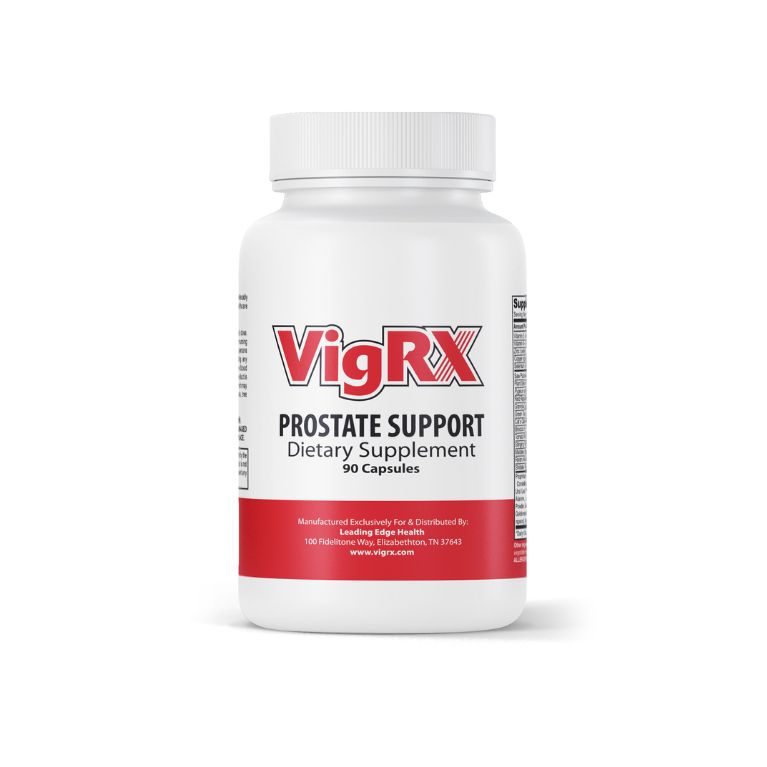
|
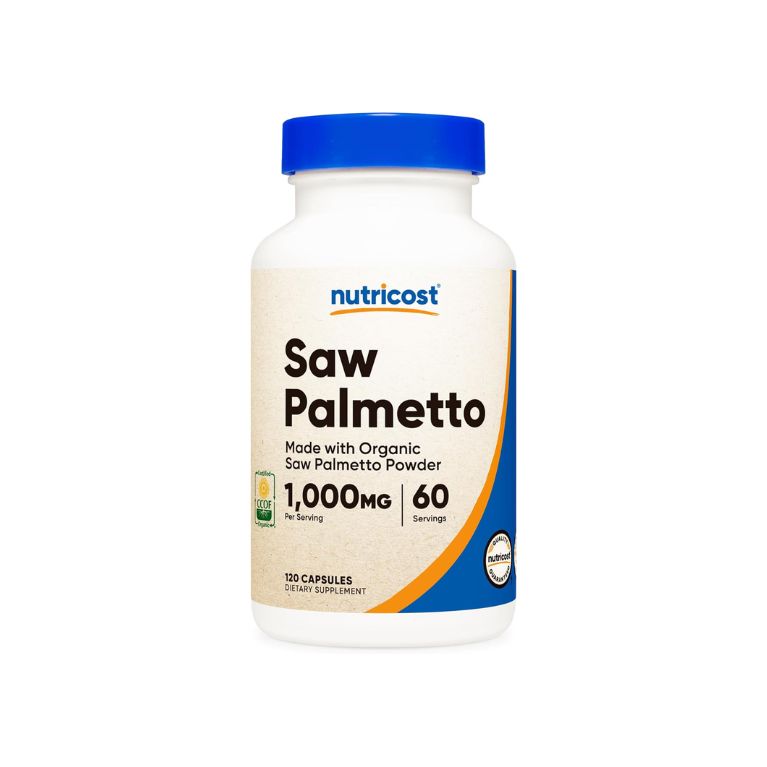
|
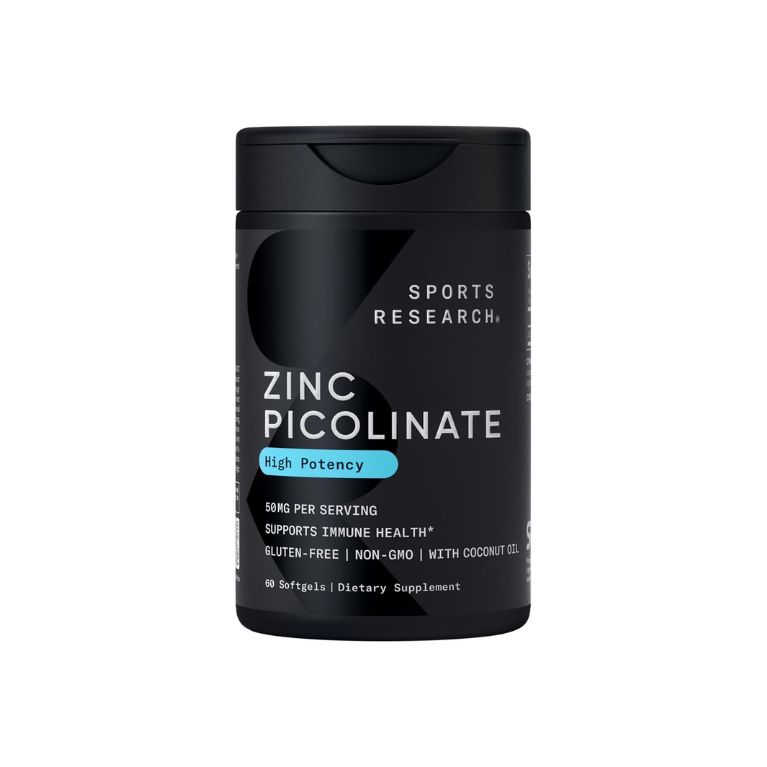
|
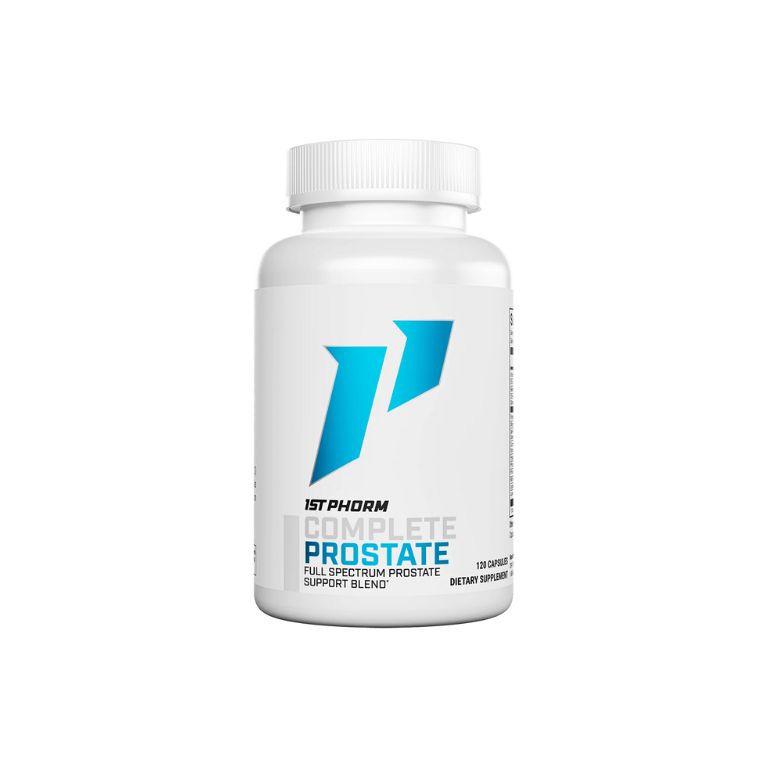
|
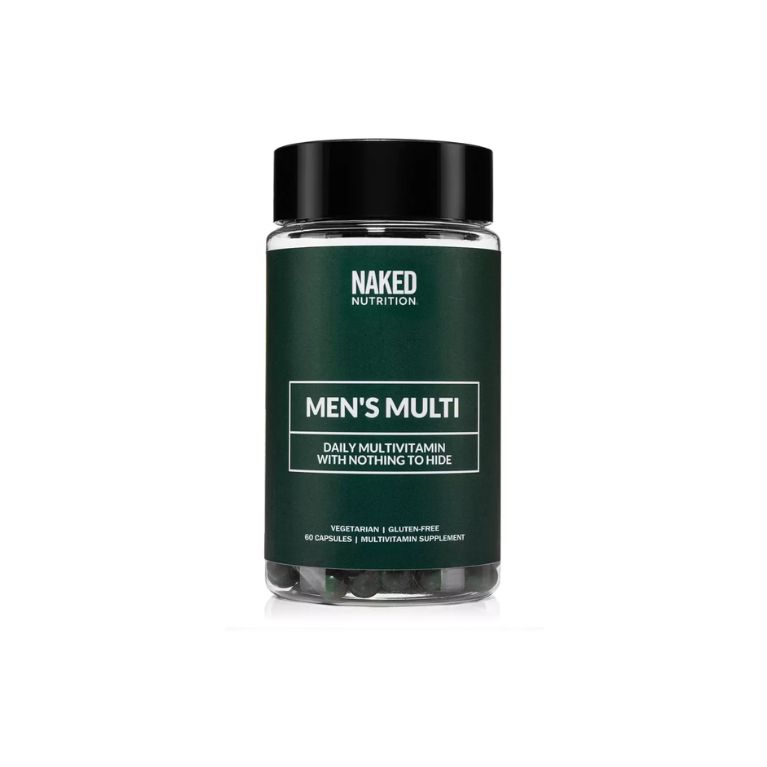
|
|
| VigRX Prostate Support | Nutricost Saw Palmetto Capsules | Sports Research Zinc Picolinate | 1st Phorm Complete Prostate | Naked Nutrition Multivitamin for Men | |
| Rating | |||||
| Cost per serving | $1.67 | $0.30 | $0.33 | $0.83 | $1.00 |
| Servings per container | 30 | 60 | 60 | 60 | 30 |
| Active ingredients | 30 | Saw palmetto | Zinc picolinate | Saw palmetto, plant sterols (beta-sitosterol), pygeum, vitamin C, zinc, selenium, chromium, and 7 more | Vitamin A, vitamin C, vitamin D, vitamin E, choline, calcium, iodine, and 38 more |
Best supplement for enlarged prostate: VigRX Prostate Support
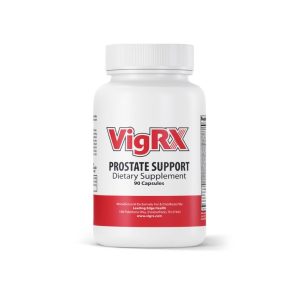

Key product features
What you should know
VigRX contains several ingredients that may boost prostate health and function, like saw palmetto, beta-sitosterol, pumpkin seed powder, and pygeum bark.
- VigRX provides a number of herbal ingredients, antioxidants, vitamins, and trace minerals. However, it also features a proprietary blend, so it is impossible to know how much of each ingredient of the blend is in the supplement.
- At $1.67 per serving, this supplement is significantly more expensive than other prostate health supplements if purchased in one bottle. However, bulk purchasing and subscription options can unlock significant savings.
- This supplement is a good choice for men who want to include as many potentially healthy ingredients as possible, as well as those who may have other sexual health concerns.
Why we like VigRX Prostate Support as best for enlarged prostate
VigRX contains 30 natural ingredients to help support prostate health, including vitamins, minerals, antioxidants, and herbal extracts. It also contains saw palmetto, beta-sitosterol, pygeum, and pumpkin seed powder in small amounts.
The supplement provides 15 milligrams of tomato fruit powder, which one study has shown is more favorable for improving antioxidant capacity in male athletes than isolated lycopene, though the study did not examine prostate health. (3) Additionally, you’ll get 300 milligrams of saw palmetto per serving, just under 320 milligrams per day, which some research found to be beneficial. (4)
This supplement may be a good choice for men who want to maintain a healthy prostate and who are already following a balanced lifestyle. According to the VigRX website, it can be used in combination with other supplements for male sexual health and erectile dysfunction (ED), which are testosterone-related concerns for men.
Unfortunately, VigRX is not third-party tested and is also the most expensive prostate health supplement on our list. Additionally, the ingredient dosages in VigRX may not be high enough to make a huge difference for prostate health. This is particularly true for the pumpkin seed powder, as it is part of a proprietary blend, and therefore, the exact amount present in the supplement isn’t available to consumers.
However, if you do decide to try this supplement, you can save money by buying multiple bottles at once, which can reduce the price to a more reasonable level. The product also comes with a 67-day guarantee, although you are required to try the product for 60 days before becoming refund-eligible—giving you only a seven-day window to return it.
Specs
| Rating | 3.5 |
| Cost per serving | $1.67 |
| Servings per container | 30 |
| Active ingredients | Vitamin E, vitamin B6, zinc, copper, selenium, saw palmetto berries, plant sterol complex, pygeum bark powder, red raspberry fruit powder, graviola leaf powder, green tea leaf, cat’s claw bark, broccoli extract, tomato fruit powder, stinging nettle leaf powder, maitake mushroom powder, reishi mushroom extract, shiitake mushroom powder, quercetin, juniper berry powder, uva ursi leaf powder, buchu leaf powder, L-glutamic acid, L-alanine, L-glycine, calcium d-glucarate, pumpkin seed powder, burdock root powder, cayenne pepper fruit powder, goldenseal root powder, gravel root powder, marshmallow root powder, parsley leaf powder |
| Third-party testing | No |
| Certifications | No |
| Subscription available | No |
Best natural prostate supplement:Nutricost Saw Palmetto Capsules
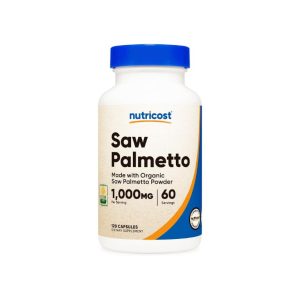

Key product features
What you should know
Nutricost Saw Palmetto Capsules feature a single key ingredient—organic saw palmetto.
- Several studies spanning decades report prostate and urinary health benefits of saw palmetto, but the largest, most well-designed studies show minimal effects. (4, 5) Still, many people say this product helps with their enlarged prostate symptoms.
- This product is the most affordable prostate health supplement on our list, with a price of just $0.30 per serving.
- Saw palmetto supplements may be most beneficial for men who are concerned about prostate health, but these supplements shouldn’t be used in place of routine prostate health exams by a healthcare professional.
- This product is made with certified organic ingredients and third-party tested for quality.
Why we like Nutricost Saw Palmetto Capsules as best natural
Nutricost Saw Palmetto Capsules contain saw palmetto, an herbal extract that has been used for centuries to support urinary health. (4) Many studies have been done in the past few decades to clarify the role of saw palmetto specifically for prostate health, as well. This supplement is our choice for the best natural prostate supplement as it contains just one ingredient—organic saw palmetto powder.
This supplement provides 1,000 milligrams of saw palmetto extract per serving, and some research has noted that as little as 320 milligrams per day may provide benefits. (4)
“Saw palmetto is in pretty much any prostate health supplement,” says Scott Miller, MD, a urologist and surgeon for Wellstar Urology in Atlanta with over 25 years of experience. Miller cautions that although saw palmetto may have the most research to support it of any commonly used prostate health ingredient, its effects are likely to be very mild. In fact, in some larger randomized-controlled trials in which the effects can be measured more precisely, little to no change has been observed from using saw palmetto. (5)
In fact, in some larger randomized-controlled trials in which the effects can be measured more precisely, little to no change has been observed from using saw palmetto. (4) While the supplement may have some small effects on prostate symptoms, it shouldn’t be considered a sure-fire way to improve an enlarged prostate.
Still, many people choose to take it preventatively in the hopes that it will help the prostate remain healthy. “We take a lot of [prostate health] supplements because we feel like it might help our overall health,” says Miller, “but is it going to treat those prostate symptoms you already have necessarily? It might help a little bit.”
Nutricost’s saw palmetto is also highly rated, with many customers reporting that it seemed to improve their enlarged prostate symptoms noticeably.
We like this supplement because it’s affordable—just $0.30 per serving. It’s also made with certified organic saw palmetto, and independent labs have tested it to ensure its quality and purity.
What customers are saying
This supplement has a 4.4 out of 5 star rating on Amazon. Satisfied reviewers say that the product really does seem to help with their enlarged prostate symptoms, and they appreciate its affordability as well.
“[I] used to have to get up at two or three in the morning to use the restroom. After taking these pills, I can sleep til my alarm goes off. No more waking up in the middle of the night.”
Lee M., Amazon
However, some reviewers note that it didn’t make much of a difference for them, and that it doesn’t seem as potent as softgels that are made with liquid saw palmetto extract.
Alternatively, Amazon reviewer George Aldous writes, “I gave this product a 90 day trial. There were minimal effects on my prostate. There weren’t any decreases in [the] number of times that I had to go to the restroom over this trial.” Some reviewers also report difficulty swallowing the capsules or headaches after taking the supplement.
Specs
| Rating | 4.6 |
| Cost per serving | $0.30 |
| Servings per container | 60 |
| Active ingredients | Saw palmetto |
| Third-party testing | Yes |
| Certifications | USDA Organic, CCOF Organic |
| Subscription available | Yes |
Best zinc supplement for prostate: Sports Research Zinc Picolinate
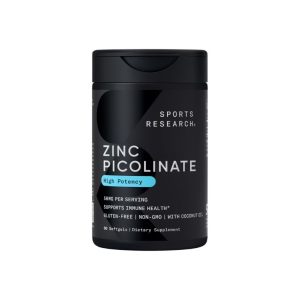

Key product features
What you should know
Sports Research Zinc Picolinate is an easy-to-absorb form of zinc, which plays a role in prostate health and offers several other benefits for certain individuals. (6)
- Zinc is an essential mineral for prostate health and overall well-being, but supplementation may not be helpful unless you’re deficient in the mineral.
- At $0.33 per serving, zinc picolinate is more expensive than some other forms of zinc, but it’s also more accessible for the body to absorb and use than others. (7)
- You should consider this supplement if you have a diagnosed zinc deficiency or your primary health care provider recommends it.
Why we like Sports Research Zinc Picolinate as best zinc prostate
Sports Research Zinc Picolinate contains 455% of the daily value (DV) for zinc, in a form of the mineral that’s easy for the body to absorb and use. (7) Zinc is a mineral that the body needs in sufficient quantities to synthesize over 300 unique enzymes, and it plays an important role in prostate health. (6, 8)
“Zinc is an important mineral, playing a critical role in over 300 enzymatic reactions in the body, from metabolism, to digestion, nerve function, and many other processes,” says Chris Mohr, Ph.D., RD, a Fortune Recommends Advisor. “Even if a man takes the recommended daily allowance for zinc, whether a sufficient level will be reached for optimized prostate functions and health will also depend on many other factors including demographic, lifestyle, and overall health status.”
In healthy men, the prostate contains the highest zinc concentration in all soft tissues. (9) However, zinc levels rapidly diminish as prostate cancer grows and spreads. Researchers have even used prostate zinc levels as a way to help determine the presence and severity of prostate cancer. (9)
There is some interest in zinc as a supplement to help suppress tumor growth in men with prostate cancer. (10) This approach is something to discuss with your healthcare provider if you currently have prostate cancer or if you’re interested in reducing the risk of prostate cancer.
“First and foremost, it’s most important to make sure you have a doctor and go to the doctor for regular checkups, in addition to getting blood work, to assess your overall wellbeing and health, including your prostate health,” explains Mohr. “The American Cancer Society suggests this should happen starting at age 40 for those at highest risk, 45 at a high risk, and 50 for those at medium risk, which is mostly based on family history of prostate cancer and for African American men. Prostate supplements should never be used in place of proper screening and healthcare checkups.” (11)
It’s worth noting that more zinc is not always better. Excessive zinc intake is linked to several potentially severe digestive complications, and too much zinc can interfere with the absorption of other essential minerals. (6)
The recommended daily allowance for zinc is 11 mg for men and 8 mg for women, with a tolerable upper limit of 40 mg for adults. (6) The Sports Research supplement contains 50 mg of zinc per serving, so it may not be best for everyone. According to Miller, for most healthy people there is enough zinc either in a multivitamin or a balanced diet.
If you have had your zinc levels tested and they are low, or if your physician has recommended a zinc supplement because you don’t eat many zinc-rich foods (like seafood, beef, and dairy), specific zinc supplementation may be wise. (6) In these instances, Sports Research Zinc Picolinate may be an excellent choice.
However, this supplement is not plant-based—it contains beeswax and gelatin. For this reason, it’s also not a good fit for those who follow a vegan diet.
What customers are saying
Amazon reviewers rate this product an average of 4.7 out of 5 stars. They say the liquid soft gels are very easy to swallow, and they feel that the zinc helps boost their overall health and well-being.
Najah, who left the product a five-star rating on Amazon, says they are “easy to swallow and good for health.”
“Very happy with the quality of this supplement.”
Kat, Amazon
Still, one reviewer says that the supplement was chalky. “These soft gels are hard as a rock,” writes Amazon reviewer Canary. “Inside the softgel was a tiny amount of liquid with a gritty, chalk-like substance.”
Specs
| Rating | 4.5 |
| Cost per serving | $0.33 |
| Servings per container | 60 |
| Active ingredients | Zinc picolinate |
| Third-party testing | Yes |
| Certifications | IGEN Non-GMO Tested |
| Subscription available | Yes |
Best over-the-counter prostate supplement: 1st Phorm Complete Prostate
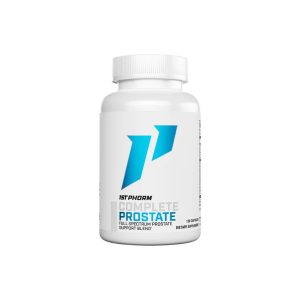

Key product features
What you should know
1st Phorm Complete Prostate features a blend of 14 nutrients and compounds that may help boost prostate health, and it’s available at hundreds of stores across the U.S. for those who prefer to shop in person.
- Complete Prostate contains several ingredients that may support prostate health, but some of these are in small quantities that may or may not be effective.
- This prostate health supplement is more expensive than some others, costing about $0.83 per serving. However, it’s free of proprietary blends and also not the most expensive prostate supplement on the market.
- Because 1st Phorm products are sold across the U.S. at hundreds of retail stores (including Academy Sports and several local and independent stores), it’s a good fit for people who prefer to shop in person for their supplements.
Why we like 1st Phorm Complete Prostate as best OTC
1st Phorm Complete Prostate contains several herbal ingredients for prostate health, along with vitamin C and the trace minerals zinc, selenium, and chromium. Notably, it contains pumpkin seed extract, saw palmetto, pygeum, and phytosterols, a source of beta-sitosterol.
Pumpkin seed extract has been shown in some studies to help reduce symptoms of enlarged prostate when taken at doses of 500-1,000 milligrams per day. (12) Because this product only contains 225 milligrams of pumpkin seed extract per serving, it may not have as strong of an effect, or any at all.
We’ve crowned it the top over-the-counter choice for one simple reason: accessibility. Unlike many others, 1st Phorm products are readily available in hundreds of sports nutrition and wellness stores nationwide, including popular chains like Academy Sports & Outdoors. This makes it an ideal choice for those who value the convenience and confidence of in-person shopping. Plus, with third-party testing and a fully transparent supplement label—free from any proprietary blends—you can trust exactly what you’re putting into your body.
1st Phorm’s Complete Prostate also contains several antioxidant compounds, such as vitamin C, prune extract, curcumin, lycopene, and lutein. Enlarged prostate may be caused by oxidative stress from a high burden of free radical compounds. Antioxidants can stabilize these free radicals by donating an electron, reducing the body’s oxidative stress load. (13)
A 2023 animal study showed that curcumin and lycopene together helped improve enlarged prostate in rats. (14) Hopefully, this will serve as a promising starting point for further research on this antioxidant combo for prostate enlargement in humans.
“Animal data are a great starting point to determine if products may have merit for the intended outcome in humans. While the results don’t always pan out to clinically meaningful outcomes, some may, and it’s important to test the outcomes of the marketed products,” Mohr says.
Specs
| Rating | 4.3 |
| Cost per serving | $0.83 |
| Servings per container | 60 |
| Active ingredients | Vitamin C, zinc, selenium, chromium, pumpkin seed extract, stinging nettle root powder, saw palmetto berry extract, curcumin rhizome extract, pygeum bark extract, phytosterols, prune extract, boron citrate, lycopene, lutein |
| Third-party testing | Yes |
| Certifications | No |
| Subscription available | Yes |
Best iodine supplement for prostate: Naked Nutrition Multivitamin for Men
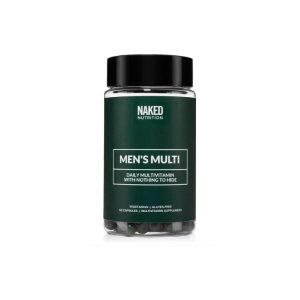

Key product features
What you should know
Naked Nutrition Multivitamin for Men is a complete multivitamin designed to support male health. It contains ingredients specifically for sexual and prostate health, along with 100% of the DV for iodine.
- Sufficient iodine may help reduce the risk of certain cancers, including prostate cancer. (15)
- Naked Nutrition Multivitamin for Men costs $1.00 per serving, which is fairly expensive for a multivitamin. However, it does contain ingredients specifically targeted towards male health issues, and it’s GMO-free and free of artificial ingredients.
- Naked Nutrition Multivitamin for Men is an excellent daily multivitamin option for most men. It may be particularly useful for men who don’t consume iodized salt, seaweed, seafood, or dairy products.
Why we like Naked Nutrition Multivitamin for Men as best iodine
Naked Nutrition Multivitamin for Men is a multivitamin and mineral supplement with added ingredients for prostate support and brain health. It provides 100% of the DV for iodine. Some research has implicated low iodine levels in the development of prostate cancer, although true iodine deficiency is rare. (15, 16) You could be at risk of iodine deficiency if you don’t use iodized salt and if your diet doesn’t contain consistent amounts of seaweed, seafood, or dairy products. (16)
In addition to iodine, this supplement contains 60 milligrams of saw palmetto powder per serving. However, this is a low dose that is unlikely to have a significant effect on prostate health. It also includes a number of antioxidant sources, including two proprietary blends with several fruit and vegetable concentrates.
“Proprietary blends are commonly used in dietary supplements, but don’t tell us anything about what is actually in the product, as the ingredient amounts are all ‘hidden’ behind the proprietary label,” Mohr adds. “While certain ingredients could have merit for overall health, the dosing of said ingredients is important to determine any potential health outcomes.”
Naked Nutrition Multivitamin for Men contains five milligrams of lycopene, an antioxidant compound isolated from tomatoes that has been shown to help with prostate enlargement. In a 2019 observational study that showed positive effects, however, the dose used was 500 milligrams per day. (17) It’s unlikely that five milligrams of lycopene would result in a noticeable improvement in prostate symptoms.
This men’s multivitamin is free of genetically modified ingredients and third-party tested. However, it contains some nutrient forms that are poorly absorbed or utilized by the body, like magnesium oxide and folic acid. (18, 19)
Additionally, many reviewers complain that the high dose of vitamin B3 (niacin) in the product caused them to experience a niacin flush, which is characterized by redness and burning across the face and chest. (20)
What customers are saying
Many customers appreciate this vitamin, saying they truly feel a difference when using it and that it’s free of side effects. Naked Multivitamins (including the men’s and women’s versions) have a combined average rating of 4.2 out of 5 stars on Amazon.
“Very well packaged, lots of good ingredients, very easy on the stomach, no bad taste. Seems to give me extra energy. Will buy again.”
Jeff, Amazon
However, several reviewers complain of the niacin flush effect caused by the high quantity of vitamin B3 in the formula. “I had a number of reactions to this multivitamin,” writes Amazon reviewer Ian, “Tingling in my scalp, a rash/redness on my face, neck, arms, and hands. It felt like I had a sunburn. The reaction occurred an hour or so after taking the multivitamin and eventually subsided a few hours later.”
Specs
| Rating | 4.3 |
| Cost per serving | $1.00 |
| Servings per container | 30 |
| Active ingredients | Vitamin A, vitamin C, vitamin D, vitamin E, vitamin K, vitamin B1, vitamin B2, vitamin B3, vitamin B6, folate, vitamin B12, vitamin B5, choline, calcium, iodine, magnesium, zinc, selenium, copper, manganese, molybdenum, grape and grape seed extract, wild blueberry extract, raspberry seed concentrate, cranberry, prune, tart cherry, wild bilberry extract, strawberry, saw palmetto powder, broccoli sprout concentrate, onion extract, tomato, broccoli, carrot, spinach, kale, brussels sprout, astaxanthin, green tea leaf extract, inositol, lutein, coenzyme Q10, lycopene |
| Third-party testing | Yes |
| Certifications | GMP certified |
| Subscription available | Yes |
How we test supplements
To choose the best prostate supplements, we considered product efficacy, safety and side effects, product value, and customer experience. Read more about these four criteria below, and check out our supplements testing methodology for more information on how we choose and test dietary supplements.
Efficacy—40%
While prostate health supplements can’t themselves reverse prostate issues, they may help prevent prostate problems in combination with a healthy diet, adequate sleep, and regular exercise. Because many people who are choosing these supplements may already be having concerns about their health, it’s extremely important that they are formulated with effective doses of research backed ingredients.
These are the criteria we judge:
- Clinical evidence
- Calories per serving
- Dose efficacy
- Synergistic effects
- Proprietary blends
Safety and side effects—35%
Because dietary supplements don’t require FDA pre-approval, safety is tantamount. That’s why safety and side effects are weighted heavily in our evaluation criteria.
Here’s what we look into for each product:
- Reported side effects
- Third-party testing
- Manufacturer accreditation
- Artificial sweeteners
Value—20%
Because prostate health supplements are likely to be taken for several months at a time, it’s important that they are cost-effective. Regardless of your budget, the supplements you choose should strike a balance between ingredient quality, effectiveness, and cost.
For this rating, our factors include:
- Price per serving
Customer experience—5%
Ideally, browsing for, ordering, and ultimately receiving your dietary supplements should be a simple, streamlined process. That’s why we factor in customer experience as part of our judging criteria.
Here are the things we consider for this category:
- Ease of purchase
- Shipping and returns
- Customer support
Common prostate health issues
The prostate is a small, muscular gland that wraps around the urethra. (21) “The only thing it does is produce fluid secreted during climax,” says Miller. “Other than that, it has no other sexual or urinary function. It’s surrounded by structures that do, however, and urine flows through the middle of the prostate.”
The most common prostate issue is when the prostate becomes enlarged. This is called benign prostatic hyperplasia (BPH). “It obstructs urinary flow, making the man urinate more frequently,” explains Miller. This can interrupt sleep and drastically impact quality of life, depending on the severity of the obstruction. (21)
Another significant prostate problem is prostate cancer. “It is the second most common cause of cancer death in men,” notes Miller. (22) Researchers are also investigating the relationship between BPH and prostate cancer, but there doesn’t appear to be a clear link between the two conditions.
Overall, focusing on healthy habits such as a balanced diet, regular exercise, and avoiding smoking and excessive alcohol consumption can help to optimize prostate health as you age. (1, 23)
“The basics for wellbeing and managing overall health remain the same for any health outcome: a balanced diet rich in fruits and vegetables, fiber, and healthy fats, among others. Of course, regular exercise, sleep, stress, tobacco use, and alcohol intake are all part of this as well. Supplements can complement these lifestyle factors and may play a role in supporting overall health—but they can never replace any of the above,” Mohr says.
Can an enlarged prostate be reversed?
Enlarged prostate reversal is possible. “But it comes down to how you define enlarged prostate,” says Miller. He explains that BPH symptom relief is the goal over physically shrinking the prostate gland, and notes that the condition itself is characterized more by its symptoms than by the prostate reaching a certain size. “If a prostate is technically enlarged, but the patient sleeps through the night and has no problems with urinary flow, that’s a non-issue,” he says. “On the other hand, the prostate doesn’t need to be terribly enlarged to cause still symptoms that need treatment.”
There are medications that can reduce the muscle tone of the prostate, making it more flexible and allowing urine to flow through the urethra more easily. Some medications can even physically shrink the prostate. (24) A final option is the surgical removal of all or part of the prostate. (25)
What are prostate supplements?
Prostate supplements are made from natural compounds that may help improve prostate health. These include nutrients such as zinc, selenium, and vitamin D, as well as herbal ingredients like saw palmetto, beta-sitosterol, and pygeum bark.
Some supplements may contain only one of these ingredients, while other prostate health supplements can contain 30 or more unique ingredients.
Prostate supplements may also fall under the umbrella of men’s sexual health supplements, with some supplements claiming to support urinary health, prostate health, and sexual desire and performance.
Are prostate supplements effective?
“That’s a big can of worms,” jokes Miller. He understands the desire to pursue a more natural option, like supplements, before resorting to a medication.
However, he stresses the importance of using supplements as an adjunct—or a helpful addition to, rather than a replacement for—proper medical care. “You never want to try to treat a symptom with a supplement, and miss a diagnosis that otherwise could have been easily treated if detected early,” he says.
As far as specific ingredients, he says that overall there’s not much research to support the use of supplements to treat enlarged prostate or prevent prostate cancer. Specific vitamins and minerals—like vitamin D, vitamin E, zinc, and selenium—may be useful for prostate health in people who are deficient in those nutrients. However, supplementing the same nutrients in people who already have enough could have no effect, or even cause harm. “The body likes the sweet spot,” Miller explains, “which is avoiding deficiencies, but also avoiding too much of something.”
“While supplements are often filled with lots of hope and promise, simply adding nutrients to a diet without a deficiency or insufficiency in said nutrient is not useful and won’t have any meaningful, or clinically relevant, impact. As always, talking with your health care provider to understand the science behind products and if use is warranted is most important,” says Mohr.
Here’s a quick summary of the existing research on some of the other most common ingredients found in prostate health supplements:
- Saw palmetto: In one review of several high-quality trials, researchers noted that the evidence is weak in supporting saw palmetto for improving prostate enlargement. However, many other studies do show small improvements. (4, 5) Miller describes the effect of saw palmetto as “significant, but still subtle.”
- Beta-sitosterol: Beta-sitosterol is a plant compound that has been shown to help reduce prostate cancer growth and prostate enlargement in animal studies. Research in humans also shows that it may help improve mild urinary symptoms. (26)
- Pygeum bark: In a 2022 observational study—which is weak evidence compared to more regulated randomized-controlled trials—researchers found that men who supplemented with pygeum bark experienced significantly fewer urinary symptoms after six months. (27)
Some research suggests that these supplements may work better together. For instance, in a 2024 randomized controlled trial, saw palmetto and beta-sitosterol together reduced enlarged prostate symptoms more than saw palmetto alone. (28)
“The dosing of nutrients is always important, and matching what has been studied to what is in the product. A research study may show promise with a certain dose, but a particular product might only have a fraction of that amount—or it’s hidden in a proprietary formula, meaning you don’t know how much is in there,” says Mohr.
Side effects of prostate supplements
Prostate supplements may cause side effects in specific individuals, as well. In browsing customer reviews, we noted some commonly reported side effects of prostate supplements included headache, digestive issues like heartburn or nausea, and worsening urinary symptoms like more frequent urination.
Unfortunately, the more ingredients a supplement has, the harder it is to pinpoint what exactly caused the side effects.
Generally, it’s best to avoid high-dose, long-term supplementation of specific nutrients unless your health care provider recommends them or you’ve been diagnosed with a deficiency of a specific nutrient. Nutrient toxicities—which can occur when you take too much of a specific vitamin or mineral—can cause several unique complications. This can especially be a problem with the fat-soluble vitamins A, D, E, and K—which are stored in fat cells and not easily excreted by the body. (29) (Interested in vitamin K for anti-aging? Here are some of the best vitamin K-rich foods.)
These vitamins are certainly important for a variety of reasons, but more isn’t always better, and starting with foods is most important. If you do decide to supplement long term, it’s a good idea to check your levels somewhat frequently to ensure you are still in a nutrient deficit and if the supplement is still needed.
Here are some of the potential side effects of other common prostate supplement ingredients:
- Saw palmetto: Diarrhea, nausea, abdominal pain, heartburn, vomiting, skin rash, dizziness. (30)
- Beta-sitosterol: Nausea, constipation, bloating, impotence, nausea. (31)
- Pygeum bark: Nausea, diarrhea, constipation, headache. (32)
For the most part, these side effects are mild and affect only a small percentage of people taking these supplements. Still, if you experience any concerning side effects you should discontinue the supplement and consult your health care provider.
Natural ways to improve prostate health
There are several ways to naturally support prostate health—and they line up with generally good health habits. “Anything that happens to be good for the heart is good for other things,” explains Miller. “It’s good for urinary function, it’s good for the immune system, it’s good for cancer prevention—whether that’s prostate cancer or other cancers.” This includes regular exercise, a healthy diet (including avoiding certain foods that may age you faster), quality sleep, and stress reduction, to name a few.
Overall, leading a healthy, balanced, low-stress lifestyle is one of the best things you can do to prevent prostate health problems. Seeking medical attention when you begin to experience urinary symptoms can help prevent more serious problems from developing. While supplements can be a useful addition to a healthy lifestyle and medical interventions for prostate health, they shouldn’t be used in place of either.
FAQs
Which prostate supplement works best?
Saw palmetto is the most heavily researched prostate health supplement, and research shows it may play a very small role in the prevention of prostate issues. (1) However, it’s still not a substitute for regular prostate exams, and it shouldn’t be used in place of medical treatment if you’re already experiencing urinary symptoms.
What is the best pill to take for enlarged prostate?
The most common initial treatment for an enlarged prostate is medication that reduces the muscle tone of the prostate, allowing it to flex more so that urine can more easily flow through the urethra. (24) “This is usually first-line therapy for an enlarged prostate,” explains Miller.
What is the fastest way to shrink an enlarged prostate?
The fastest way to reduce enlarged prostate symptoms, which doesn’t necessarily involve physically shrinking the prostate, is to take medication that allows the prostate to relax and more easily accommodate the urinary tract. (24) “We do have medications that will shrink the prostate, as well,” says Miller, “but they take a lot longer to start working, and they have a lower success rate.”
These statements have not been evaluated by the Food and Drug Administration. These products are not intended to diagnose, treat, cure, or prevent any diseases.
Our experts
Christopher Mohr, Ph.D., RD
Dr. Chris Mohr is an internationally recognized subject matter expert and speaker and performance coach. Through his facilitation and online resources, he works closely with some of the largest corporations in the world including Deloitte, Delta Airlines, Johnson & Johnson and more to help busy executives all over the world, develop the energy to thrive personally and professionally.
Victoria Burgess, Ph.D., CSCS, CISSN
Victoria Burgess earned her Ph.D. in Health and Human Performance from Concordia University Chicago and holds her NSCA CSCS and Certified Sports Nutritionist (CISSN). She is an adjunct professor in the Human Performance and Nutrition department at Concordia University Chicago & Parker University, where she teaches undergraduate, graduate, and doctoral-level courses.
Joana Neziri, M.S., NASM CPT
Joana is a writer, editor, and content strategist focusing on nutrition, fitness, and all things health. After earning a master’s degree in business from the University of North Florida, she began a career in research and digital marketing.
Jessica Coulon
Jessica is a contributing editor and writer who specializes in fitness, health, nutrition, and science content. Previously, she was an editor for Popular Mechanics and Bicycling, where she covered pro cycling news, wrote how-to guides, and tested all the latest and greatest bike gear. She was also a regular shoe tester and contributor for Runner’s World. You can often find her skiing or riding her mountain bike, and racing with the F1RE female enduro team.
Kelly Uhler
Kelly has a multifaceted background in elder care, health care, and copywriting. She has worked for organizations such as A Place For Mom and Homecare.com, which gave her the opportunity to work closely with families, providing reliable information to help them make informed decisions about their loved one’s health, safety, and quality of life.

SaVanna Shoemaker, MS, RDN, LD
Fortune Recommends Writer
About Author
Sources
- Nagakura, Y., Hayashi, M., & Kajioka, S. (2022). Lifestyle habits to prevent the development of benign prostatic hyperplasia: Analysis of Japanese nationwide datasets. Prostate international, 10(4), 200–206. https://doi.org/10.1016/j.prnil.2022.06.004
- Prostate enlargement (Benign prostatic hyperplasia). (2024, May 21). National Institute of Diabetes and Digestive and Kidney Diseases. https://www.niddk.nih.gov/health-information/urologic-diseases/prostate-problems/prostate-enlargement-benign-prostatic-hyperplasia
- Gholami, F., Antonio, J., Evans, C., Cheraghi, K., Rahmani, L., & Amirnezhad, F. (2021). Tomato powder is more effective than lycopene to alleviate exercise-induced lipid peroxidation in well-trained male athletes: randomized, double-blinded cross-over study. Journal of the International Society of Sports Nutrition, 18(1), 17. https://doi.org/10.1186/s12970-021-00415-7
- Kwon Y. (2019). Use of saw palmetto (Serenoa repens) extract for benign prostatic hyperplasia. Food science and biotechnology, 28(6), 1599–1606. https://doi.org/10.1007/s10068-019-00605-9
- Franco, J. V., Trivisonno, L., Sgarbossa, N. J., Alvez, G. A., Fieiras, C., Escobar Liquitay, C. M., & Jung, J. H. (2023). Serenoa repens for the treatment of lower urinary tract symptoms due to benign prostatic enlargement. The Cochrane database of systematic reviews, 6(6), CD001423. https://doi.org/10.1002/14651858.CD001423.pub4
- Office of Dietary Supplements—Zinc. (2022). https://ods.od.nih.gov/factsheets/Zinc-HealthProfessional/
- Ośko, J., Pierlejewska, W., & Grembecka, M. (2023). Comparison of the Potential Relative Bioaccessibility of Zinc Supplements-In Vitro Studies. Nutrients, 15(12), 2813. https://doi.org/10.3390/nu15122813
- Karunasinghe N. (2022). Zinc in Prostate Health and Disease: A Mini Review. Biomedicines, 10(12), 3206. https://doi.org/10.3390/biomedicines10123206
- Li, D., Stovall, D. B., Wang, W., & Sui, G. (2020). Advances of Zinc Signaling Studies in Prostate Cancer. International journal of molecular sciences, 21(2), 667. https://doi.org/10.3390/ijms21020667
- Singh, C. K., Chhabra, G., Patel, A., Chang, H., & Ahmad, N. (2021). Dietary Phytochemicals in Zinc Homeostasis: A Strategy for Prostate Cancer Management. Nutrients, 13(6), 1867. https://doi.org/10.3390/nu13061867
- American Cancer Society. American Cancer Society Recommendations for Prostate Cancer Early Detection. Accessed Aug 20, 2024. https://www.cancer.org/cancer/types/prostate-cancer/detection-diagnosis-staging/acs-recommendations.html
- Csikós, E., Horváth, A., Ács, K., Papp, N., Balázs, V. L., Dolenc, M. S., Kenda, M., Kočevar Glavač, N., Nagy, M., Protti, M., Mercolini, L., Horváth, G., Farkas, Á., & On Behalf Of The Oemonom (2021). Treatment of Benign Prostatic Hyperplasia by Natural Drugs. Molecules (Basel, Switzerland), 26(23), 7141. https://doi.org/10.3390/molecules26237141
- Mitsunari, K., Miyata, Y., Matsuo, T., Mukae, Y., Otsubo, A., Harada, J., Kondo, T., Matsuda, T., Ohba, K., & Sakai, H. (2021). Pharmacological Effects and Potential Clinical Usefulness of Polyphenols in Benign Prostatic Hyperplasia. Molecules (Basel, Switzerland), 26(2), 450. https://doi.org/10.3390/molecules26020450
- Wang, S., He, W., Li, W., Zhou, J. R., & Du, Z. (2023). Combination of Lycopene and Curcumin Synergistically Alleviates Testosterone-Propionate-Induced Benign Prostatic Hyperplasia in Sprague Dawley Rats via Modulating Inflammation and Proliferation. Molecules (Basel, Switzerland), 28(13), 4900. https://doi.org/10.3390/molecules28134900
- Dijck-Brouwer, D. A. J., Muskiet, F. A. J., Verheesen, R. H., Schaafsma, G., Schaafsma, A., & Geurts, J. M. W. (2022). Thyroidal and Extrathyroidal Requirements for Iodine and Selenium: A Combined Evolutionary and (Patho)Physiological Approach. Nutrients, 14(19), 3886. https://doi.org/10.3390/nu14193886
- Office of Dietary Supplements—Iodine. (2024). https://ods.od.nih.gov/factsheets/Iodine-HealthProfessional/
- Li, Y. Z., Liang, W. N., Zhang, G. W., Weng, Z. Q., Zhong, Y., Xu, S., & Shang, X. J. (2019). Zhonghua nan ke xue = National journal of andrology, 25(11), 1001–1004. https://pubmed.ncbi.nlm.nih.gov/32233234/
- Blancquaert, L., Vervaet, C., & Derave, W. (2019). Predicting and Testing Bioavailability of Magnesium Supplements. Nutrients, 11(7), 1663. https://doi.org/10.3390/nu11071663
- Carboni L. (2022). Active Folate Versus Folic Acid: The Role of 5-MTHF (Methylfolate) in Human Health. Integrative medicine (Encinitas, Calif.), 21(3), 36–41. https://www.ncbi.nlm.nih.gov/pmc/articles/PMC9380836/
- Office of Dietary Supplements—Niacin. (2022). https://ods.od.nih.gov/factsheets/Niacin-HealthProfessional
- Singh, O., & Bolla, S. R. (2023). Anatomy, Abdomen and Pelvis, Prostate. In StatPearls. StatPearls Publishing. https://www.ncbi.nlm.nih.gov/books/NBK540987/
- Cancer Facts for Men | Common cancers in Men. (2023). American Cancer Society. https://www.cancer.org/cancer/risk-prevention/understanding-cancer-risk/cancer-facts/cancer-facts-for-men.html
- Wilson, K. M., & Mucci, L. A. (2019). Diet and Lifestyle in Prostate Cancer. Advances in experimental medicine and biology, 1210, 1–27. https://doi.org/10.1007/978-3-030-32656-2_1
- Plochocki, A., & King, B. (2022). Medical Treatment of Benign Prostatic Hyperplasia. The Urologic clinics of North America, 49(2), 231–238. https://doi.org/10.1016/j.ucl.2021.12.003
- Miernik, A., & Gratzke, C. (2020). Current Treatment for Benign Prostatic Hyperplasia. Deutsches Arzteblatt international, 117(49), 843–854. https://doi.org/10.3238/arztebl.2020.0843
- Macoska J. A. (2023). The use of beta-sitosterol for the treatment of prostate cancer and benign prostatic hyperplasia. American journal of clinical and experimental urology, 11(6), 467–480. https://pubmed.ncbi.nlm.nih.gov/38148931/
- Cambronero, J., Osca-García, J. M., Merino-Salas, S., Miguel, J. M., Borralleras, C., & López-Alcina, E. (2022). Efectividad del tratamiento con Pygeum africanum en pacientes con síntomas del tracto urinario inferior e hiperplasia benigna de próstata: estudio transversal en la práctica clínica real en España (Estudio PROFIT) [Effectiveness of treatment with Pygeum africanum in patients with lower urinary tract symptoms and benign prostatic hyperplasia: a cross-sectional study in the real-world clinical practice in Spain (The PROFIT Study)]. Archivos espanoles de urologia, 75(3), 219–227. https://pubmed.ncbi.nlm.nih.gov/35435166/
- Sudeep, H. V., Thomas, J. V., & Shyamprasad, K. (2020). A double blind, placebo-controlled randomized comparative study on the efficacy of phytosterol-enriched and conventional saw palmetto oil in mitigating benign prostate hyperplasia and androgen deficiency. BMC urology, 20(1), 86. https://doi.org/10.1186/s12894-020-00648-9
- Reddy, P., & Jialal, I. (2022). Biochemistry, Fat Soluble Vitamins. In StatPearls. StatPearls Publishing. https://www.ncbi.nlm.nih.gov/books/NBK534869/
- Crescioli, G., Maggini, V., Raschi, E., Gonella, L. A., Luxi, N., Ippoliti, I., Di Giovanni, V., Bonaiuti, R., Firenzuoli, N., Gallo, E., Menniti-Ippolito, F., Moretti, U., Trifirò, G., Vannacci, A., Firenzuoli, F., & Lombardi, N. (2023). Suspected adverse reactions to medications and food supplements containing Serenoa repens: A worldwide analysis of pharmacovigilance and phytovigilance spontaneous reports. Phytotherapy research : PTR, 37(11), 5289–5299. https://doi.org/10.1002/ptr.7960
- Benign prostatic hyperplasia and complementary and integrative approaches: What the science says. (2022). NCCIH. https://www.nccih.nih.gov/health/providers/digest/benign-prostatic-hyperplasia-and-complementary-and-integrative-approaches-science
